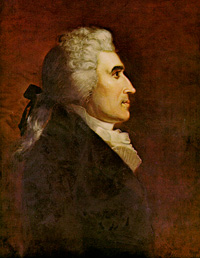
Jonathan Dayton was an American Founding Father and politician from New Jersey. At 26, he was the youngest person to sign the Constitution of the United States. He was elected to the United States House of Representatives in 1791 and later served from 1795 to 1799 as its third Speaker. He left the House in 1799 after being elected to the U.S. Senate, where he served one term. Dayton was arrested in 1807 for alleged treason in connection with Aaron Burr's conspiracy to establish an independent country in the Southwestern United States and parts of Mexico. He was exonerated by a grand jury, but his national political career never recovered.

William Pennington was an American politician and lawyer. He was the 13th governor of New Jersey from 1837 to 1843. He served one term in the United States House of Representatives, during which he served as Speaker of the House from 1860 to 1861.
These are tables of congressional delegations from New Jersey to the United States Senate and United States House of Representatives.
New Jersey's 8th congressional district is currently represented by Democrat Rob Menendez, who has served in Congress since January 2023. The district is majority Hispanic, and includes some of the most urban areas of New Jersey, including parts of Newark and Jersey City, as well as Elizabeth.

The 1812–13 United States House of Representatives elections were held on various dates in various states between August 3, 1812, and April 30, 1813. Each state set its own date for its elections to the House of Representatives before the first session of the 13th United States Congress convened on May 24, 1813. They coincided with James Madison being re-elected president.
New Jersey's 10th congressional district is an urban congressional district in the U.S. state of New Jersey. The district consists of portions of Essex, Hudson and Union counties, and includes the cities of Newark and Orange. The district is majority African American and is represented in Congress by Democrat LaMonica McIver, who was sworn in on September 23, 2024 to finish the term of the late Donald Payne, Jr.
New Jersey's 9th congressional district is an urban congressional district in the U.S. state of New Jersey, and was represented in Congress by Democrat Bill Pascrell until his death in 2024, first elected in 1996 from the old 8th district. The 9th district consists largely of municipalities in Bergen and Passaic Counties.
New Jersey's 4th congressional district is a congressional district that stretches along the New Jersey Shore. It has been represented by Republican Chris Smith since 1981, the second-longest currently serving member of the US House of Representatives and the longest serving member of Congress from New Jersey in history.
New Jersey's 3rd congressional district is represented by Democrat Andy Kim of Moorestown who has served in Congress since 2019.

Edwin Bell Forsythe was an American Republican Party politician from New Jersey who represented parts of Burlington, Ocean, and Camden Counties in the United States House of Representatives from 1970 until his death from lung cancer in 1984.
This is a complete list of current members of the United States House of Representatives based on seniority. For the most part, representatives are ranked by the beginning of their terms in office. Representatives whose terms begin the same day are ranked alphabetically by last name.

Mahlon Dickerson was a justice of the Supreme Court of New Jersey, the seventh governor of New Jersey, United States Senator from New Jersey, the 10th United States Secretary of the Navy and a United States district judge of the United States District Court for the District of New Jersey.

New Jersey elected its members November 7, 1820. There were an unusually large number of candidates, 119 candidates according to one contemporary newspaper. Some candidates ran under an "Anti-Caucus" ticket. Only 1 of the 6 six incumbents would serve in the next term, as 4 retired and 1 died after re-election.

New Jersey held its election October 10–11, 1814. The state returned to an at-large basis for electing its representatives, abolishing the short-lived districts of the previous election.

New Jersey elected its members November 4, 1828.

The 1900 United States presidential election in New Jersey took place on November 6, 1900. Voters chose ten representatives, or electors to the Electoral College, who voted for president and vice president.

The 2022 United States House of Representatives elections in New Jersey were held on November 8, 2022, to elect the 12 U.S. representatives from the state of New Jersey, one from each of the state's 12 congressional districts.
This page is based on this
Wikipedia article Text is available under the
CC BY-SA 4.0 license; additional terms may apply.
Images, videos and audio are available under their respective licenses.








